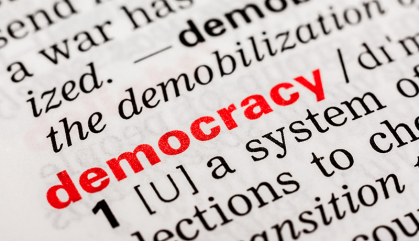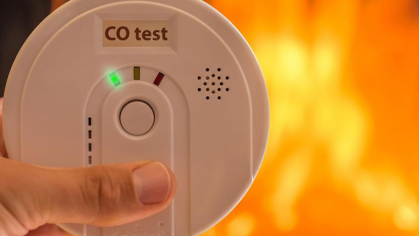Is Our Democracy Under Threat?

Republicans and Democrats don't agree on much these days. But both parties are sounding the same alarm during their candidates' midterm campaigns: Our democracy is at risk of unraveling.
Democrats claim that the dissolution of democracy will come at the hands of election deniers. Republicans claim its end will come from repeated failed attempts to remove elected officials like Trump from office.
But is the end of democracy really imminent, or is the “threat to democracy” a hyperbolic calling card to court votes? Rutgers Today talked with John Farmer Jr., director of the Rutgers Eagleton Institute of Politics, about events that resulted in this threat to democracy, the problems with apocalyptic messaging, and how the silent majority of Americans – the political moderates – are largely disenfranchised as a result.
What do both sides see as the threat to democracy? (Or what different threats to democracy do Democrats and Republicans see?) Is there any way to reconcile these concerns?
The latest public opinion surveys, from the Rutgers-Eagleton Poll and others, reflect broad agreement that our democracy is under threat. In fact, concern for the future of our republic has displaced issues such as climate change and the pandemic as paramount among the general public. But the consensus ends there.
Democrats, many independents and some Republicans see the source of the threat in former President Trump's insistence that the 2020 election was stolen. This insistence led to the violence at our nation's Capitol on January 6, 2021, and to the nomination of election deniers for jobs critical to election law enforcement in the upcoming midterms.
Republicans tend to see the threat to democracy in the repeated attempts to frustrate the democratic process by first removing President Trump from office and now seeking to prevent him from running again. These attempts began with the so-called Steele dossier, proceeded through two failed impeachment trials and persist to this day in the numerous civil and criminal investigations of former President Trump, his campaign and his businesses. To the former president’s supporters, these efforts amount to an attempt to frustrate democracy by preventing his supporters from voting for him.
Since the left and the right report being concerned that we are facing an existential threat to democracy, does either side present strong arguments? Why or why not?
Truth matters when evaluating whose arguments are stronger. Despite the opportunity to establish the former president's claims afforded by the filing of dozens of lawsuits claiming election fraud, there is simply no evidence that the 2020 election was stolen. The fact that the former president has been able to persuade millions of people of that unreality and to raise hundreds of millions of dollars to advance that false notion is greatly disturbing.
I will also say, however, that the repeated failed attempts to remove President Trump – the second impeachment resulting from the January 6 violence was a particularly botched effort – also concern me. I did some work years ago in a country where the losing party in an election usually went into hiding, for fear of prosecution or worse by the victors. I fear that the "lock him or her up" mentality could be corrosive to our democracy if it becomes the norm, for that would reflect a fundamental breakdown in our political culture.
You wrote in recent op-eds about the ignored middle – the centrists – who don’t seem to be considered. How do they feel about a threat to democracy? And how much of the population do you think these centrists truly represent overall?
The term I prefer in describing the current state of affairs is the “politics of the excluded middle.” Students of formal logic will remember studying the logical fallacy of the excluded middle; the fallacy occurs when an argument offers a false choice between two extreme choices. That is what our politics is offering today.
A plurality of Americans are neither Democrats nor Republicans, but independent voters; add to their numbers those Republicans and Democrats who are disaffected from their parties' more extreme positions, and you have a majority of the country. That majority's voice is largely disenfranchised when "safe" seats are created in the congressional redistricting process – for when safe seats are created, the election that matters becomes the party primary, not the general election. And party primary voters tend to be more ideologically uncompromising than voters in the general election.
Do you think our democracy is more fragile than other points in history? Or, is “democracy under siege” just media hype?
I do think that our democracy has become fragile in a more serious way than at other points in history. The root cause, in my view, is the toxic and all-pervading role of money in corrupting and distorting public discourse.
The Supreme Court’s decision equating spending with political speech has transformed political speech – it is now all about raising money. In order to raise the hundreds of millions of dollars necessary to fund campaigns, the parties have to persuade contributors that their donations are needed urgently. They do this by making the case that electing the other party would be catastrophic for the nation and would spell the end of America as we know it.
The natural result is a spirit of ideological rigidity. Once you have saturated your supporters with such apocalyptic rhetoric, how do you explain to your donors the need to find common ground in order to govern? Not surprisingly, “compromise” has become a dirty word because compromises frequently come at the expense of principle. But here's the heart of the matter: our Constitution requires compromise in order to function. It was designed as a pragmatic framework to settle differences while preventing any faction from becoming dominant and imposing its will.
If neither political side is willing to see the other side’s point of view and work through our differences, our Constitution is a prescription for paralysis. It cannot work. The restoration of the ethos of civility and compromise is our greatest challenge.
Across the country there are people running for office who support claims that the 2020 election was stolen and would oversee the process. What impact can they have on elections and voting if they win?
Time will tell what effect the candidacies of election deniers for critical election offices will have.
Let’s assume that they are elected (and one wonders whether they will question those results). I would like to believe that their beliefs about the 2020 election are grounded in ignorance, not evil, and that they will adhere scrupulously to the oaths they will be required to take.
Many of the witnesses before the January 6 Select Committee have been ardent Trump supporters, but they quite properly placed their duty as citizen office holders above their fealty to any candidate or party. I would like to believe that the same would hold true if 2020 election-deniers assume office. My hope is that they will not be elected. If they are, my fingers will be crossed!


